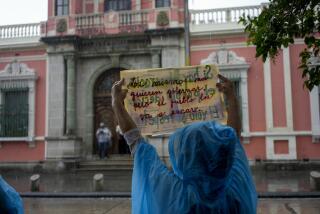Appeals court orders review of Guatemalan woman’s asylum case
- Share via
A Guatemalan woman who argued in an asylum case that she would be in danger if she were to be returned to her native country because of the high rate of murders of women there can have her case reviewed, the U.S. 9th Circuit Court of Appeals ruled Monday.
The court sent the case back to the Board of Immigration Appeals to consider whether Guatemalan women make up a “social group” and should be eligible for asylum based on that. In the ruling, the court ordered the board to determine whether Lesly Yajayra Perdomo has demonstrated a fear of persecution based on her membership in that group.
To obtain asylum, applicants must show that they are unable or unwilling to return home because of persecution or fear of persecution based on race, religion, nationality, political opinion or membership in a particular social group.
Perdomo sneaked into the United States in 1991 to join her mother in Reno, where she now works as a Medicaid account executive.
In 2003, Perdomo appeared in immigration court and argued that she should receive asylum because she feared persecution, citing widespread violence against women in Guatemala, according to the ruling. She presented evidence about the torture and killing of women and the lack of response from the Guatemalan government.
The immigration court and the Board of Immigration Appeals ruled that “all women in Guatemala” or those between 14 and 40 years of age was too broad to qualify as a protected social group.
The 9th Circuit judges disagreed and said that they had previously determined that Gypsies, homosexuals and Somali woman facing genital mutilation made up social groups for purposes of asylum.
“What is most momentous about this is that the 9th Circuit is emboldening judges and trial lawyers who appear in immigration courts to make the case that women are capable of being a social group,” said Bruce Einhorn, a former immigration judge who directs the asylum and refugee clinic at Pepperdine University School of Law. “It is not a guarantee, but it is an invitation to make that argument.”
Einhorn said he didn’t believe that the ruling opened the door to all women from a country experiencing a crime wave.
More to Read
Sign up for Essential California
The most important California stories and recommendations in your inbox every morning.
You may occasionally receive promotional content from the Los Angeles Times.










